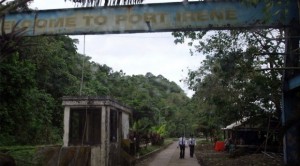The Bureau of Customs (BOC) has seized 38 secondhand vehicles from an imported car dealer in Cagayan province, thwarting an attempt to illegally take them out of the Cagayan Special Economic Zone and Freeport (CSEZF) in Port Irene, Santa Ana, Cagayan province.
According to Customs Commissioner John Philip Sevilla, a team was immediately dispatched from the bureau to check out the vehicles after Fenix (Ceza) International, Inc., one of two accredited used-car importers at the free port, filed an import entry for the seized cars.
Intent to import
“When you file an entry, it means that there is intent to import into the rest of the Philippines,” Sevilla told a press briefing on Friday, noting that the documents did not mention what type of cars were being imported into the country.
An investigation showed that the vehicles did not fall under the exemptions enumerated under Executive Order No. 156 banning the importation of used vehicles with the exception of light trucks, buses and special-purpose automobiles, said Sevilla.
Records showed that Fenix filed four import entries for the 38 secondhand vehicles, which were valued at P1.2 million.
“They did not fall under the exemptions, that is why we issued a warrant of seizure [for the 38 cars],” Sevilla said.
He said the confiscated vehicles were mostly small passenger vehicles, including two Hummer H2, a 2001 Toyota BB, Toyota Sienta, 2002 Toyota Alphard, 2003 Honda Fit and a 2000 Nissan Serena, among others.
The 38 vehicles were part of a shipment of more than 800 second-hand cars which arrived in Port Irene in three batches. The first shipment, composed of 347 units, arrived on Dec. 14 last year, the second batch of 266 cars on Jan. 3 and the last batch, consisting of 234 cars from South Korea arrived on Jan. 27.
EO 156 issue resolved
Sevilla on Friday reiterated that the bureau would strictly implement EO 156, which also covers vehicle importations made through Port Irene.
“The position of the BOC as well as the Supreme Court on the importation of used cars is very clear,” he stressed, noting that the importation of used cars has been the subject of many legal cases.
“But this is a resolved issue. I hope there will no longer be confusion in the minds of the public and the minds of importers,” he said.
According to Sevilla the high court has ruled that “EO 156 is legal… these [used] cars are allowed into the free ports but they cannot be brought out of these ports.”
In February 2013, the high court declared the constitutionality of the executive order issued in 2002 by then President Gloria Macapagal-Arroyo.
Smuggling continues
But if the government was hoping that the ruling would put a stop to the virtual smuggling of vehicles through Port Irene, it was mistaken. Imported used vehicles have reportedly continued to land at Port Irene.
Following the high court ruling affirming the validity of EO 156, the BOC ordered customs personnel in Port Irene to stop the release of more than 200 used cars and vans that arrived at the free port after the high tribunal handed down the decision.
Last month, a shipment of more than 200 used vehicles arrived from the ports of Nagoya and Yokohama in Japan.
It was the second shipment of used cars to arrive at Port Irene in the span of three weeks, following a shipment of more than 300 vehicles in December 2013, also from Japan.
Car dealers protest
The high court decision last year stemmed from a 2008 suit filed by car dealers at the free port which questioned the application of EO 156 on car imports there.
The car dealers argued that the ban imposed by EO 156 applied only to used-vehicle imports at the Subic Bay Freeport in Zambales province.
The Supreme Court ruled that the petitioners’ legal right to be exempt from the application of EO 156 was “doubtful” because of the high court’s decision in a February 2006 case that imposed a ban on used-car importations, with exceptions.
Issued in the wake of a slump in the sales of new motor vehicles in the country, EO 156 was meant to strengthen the local automotive industry and deter smuggling. However, three groups of vehicle importers later questioned the validity of the order before the Olongapo Regional Trial Court, which nullified portions of EO 156.
The Court of Appeals later upheld the lower court’s decision, but in February 2006, the Supreme Court allowed the importation of used vehicles only through the Subic Special Economic Zone.
In addition, the high court ruled that the vehicles “may only be stored, used or traded, or exported out of Philippine territory, but [these] cannot be imported into the Philippines outside of the secured fenced-in former Subic Naval Base area.”
The vehicle importers filed motions for clarification and reconsideration, which the Supreme Court denied in August 2006.
Final ruling
A final ruling by the high court in October 2007 denied the motion of the Motor Vehicles Importers Association of the Subic Bay Freeport to be allowed to sell used cars outside the free port.
The car dealers and officials of the Cagayan Economic Zone Authority (Ceza), which runs and manages the freeport, have denied allegations that smuggling has been going on at the port.
Defending the importation of used cars in his home province, Sen. Juan Ponce Enrile has said that EO 156 was unconstitutional and that the Supreme Court was wrong in upholding it. He also denied allegations that Cagayan had become a smuggling haven.
Enrile also challenged the President’s authority to issue the ban, arguing that only Congress could ban the importation of used items.
RELATED STORIES
Cagayan economic zone allows used-car importations anew
Santiago hits P800M Ceza budget
Contractor corners P5B Ceza project
Ceza eyes reexport of some 600 used cars
